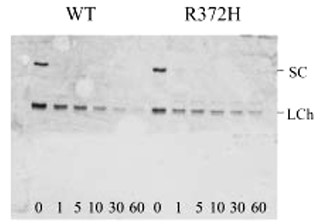Anti-Factor VIII [4 Clones] — Library Pack
Data
- -
- -
DescriptionBackground Factor VIII (FVIII) is an essential blood-clotting protein, also known as anti-hemophilic factor (AHF). In humans, factor VIII is encoded by the F8 gene. Defects in this gene result in hemophilia A, a recessive X-linked coagulation disorder. Factor VIII is produced in liver sinusoidal cells and endothelial cells outside of the liver throughout the body. This protein circulates in the bloodstream in an inactive form, bound to another molecule called von Willebrand factor, until an injury that damages blood vessels occurs. In response to injury, factor VIII is activated and separates from von Willebrand factor. The active protein (sometimes written as factor VIIIa) interacts with another coagulation factor called factor IX. This interaction sets off a chain of additional chemical reactions that form a blood clot. Immunogen Purified human Factor VIII Specificity 10101, 10102, and 10103 recognize full-length human Factor VIII (epitopes not determined). 10104 recognizes an epitope at the N-terminal region of the 83kDa light chain of Factor VIII. These antibodies do not cross-react with von Willebrand factor. Product Preparation Antibodies are purified by a multi-step process including the use of protein A or G to assure extremely low levels of endotoxins, leachable protein A or aggregates. Storage & Stability Upon initial thawing, appropriately aliquot and store at -80°C. For long-term storage, keep at -80°C. Avoid repeated freeze-thaw cycles. Technical ProtocolsReferences & Citations1) Takeyama M et al. (2012) Biochemistry 51: 820-828. 2) Nogami K et al. (2005) Blood 105: 4362-4368. 3) Fay PJ et al. (2001) J Biol Chem 276: 12434-12439. 4) Fay PJ (1988) Arch Biochem Biophys 262: 525-531. 5) Fay PJ et al. (1986) Biochim Biophys Acta 87: 268-278. |



